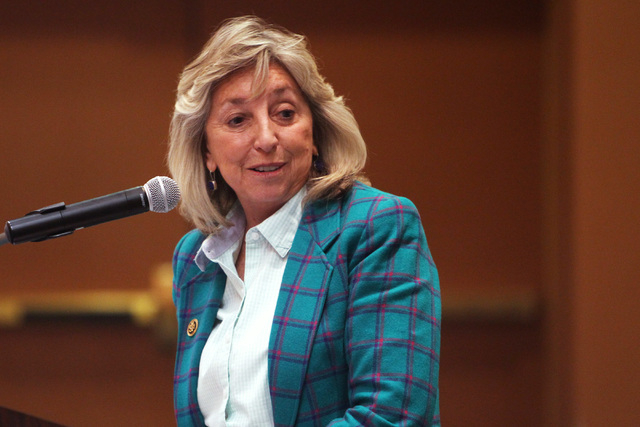Titus urges discussion of updating U.S.-China air pact
With an eye toward clearing the way toward nonstop flights between China and Las Vegas, Rep. Dina Titus has co-written a letter to President Obama, encouraging him to discuss updating an air transport agreement between the U.S. and China with President Xi Jinping.
The Chinese leader is scheduled to meet with Obama at the White House later this week. While Xi's itinerary is filled with meetings with American businessmen, an address to the United Nations and discussions about cybersecurity, Titus, D-Nev., and Rep. Grace Meng, D-N.Y., asked Obama to discuss the agreement they say has become outdated and unfair to U.S. air carriers.
Tourism leaders estimate that more than 300,000 Chinese residents visit Las Vegas every year and that the demand is expected to climb to 1 million a year by 2021.
The current agreement between the United States and China, signed in 2007, caps the number of weekly flights to the United State from three major airports at Beijing, Guangzhou and Shanghai. After a 21 percent increase in Chinese tourists between 2013 and 2014, flights to the U.S. by Chinese airlines have been running about 90 percent full.
Because of the cap on flights, secondary gateway airports like McCarran International are at a disadvantage securing regularly scheduled nonstop flights.
Wei Hou, vice president of Hainan Airlines, an air carrier that would be capable of scheduling nonstop flights from China to Las Vegas someday, addressed the issue at the Boyd Group International's aviation summit in Las Vegas in August.
"The current U.S.-China air transport agreement simply does not allow for the increased demand that is taking place," the letter to Obama from Titus and Meng says. "Without reforms to the agreement to allow for more flights from these major airports and fair and transparent access for U.S. carriers to service China, we risk blunting this vital economic relationship."
When representatives of the two countries signed the agreement in 2007, the United States received a commitment from China to work toward open-skies agreement, a policy that enables airlines from both countries to develop as many flights between the nations as economically viable. Titus said at the time, it was viewed as a major step considering the Chinese insistence that the countries take a gradual approach toward the liberalization of the agreements.
"Unfortunately, since that time, U.S. carriers have experienced increasing difficulties in securing economically viable slots at Chinese airports," the letter says. "The Chinese process for allocating airport slots not only strays from international standards but also lacks transparency. This problem has become so severe over the last two years that certain U.S. carriers are unable to exercise rights currently available under the existing regime.
"Talks earlier this year between our respective air transport negotiators, the first in four years, faltered over this very issue," the letter says. "Without a commitment from the Chinese government on increased transparency and fairness in their allocation of valuable access to their primary airports, we fear that this issue will remain at a standstill. We ask that when you meet with President Xi, allowing for more travel and commerce between our nations be among the top issues of discussion."
Titus, a member of the House Aviation subcommittee, was an advocate for expanded terms for travel visas between the two countries. Last November, the Obama administration announced new terms in a bilateral agreement that encourages more travel and is expected to boost the number of Chinese visitors to the United States to 7 million by 2021, which would create an economic impact of $85 billion.
Contact reporter Richard N. Velotta at rvelotta@reviewjournal.com or 702-477-3893. Find @RickVelotta on Twitter.






















